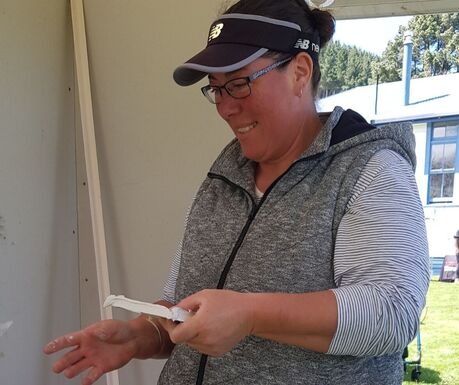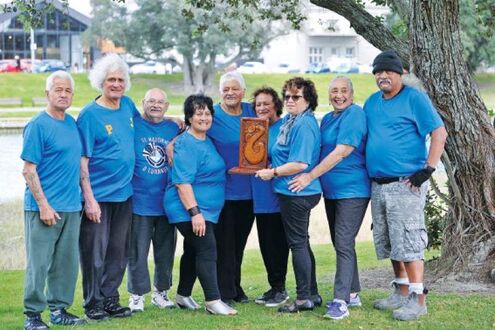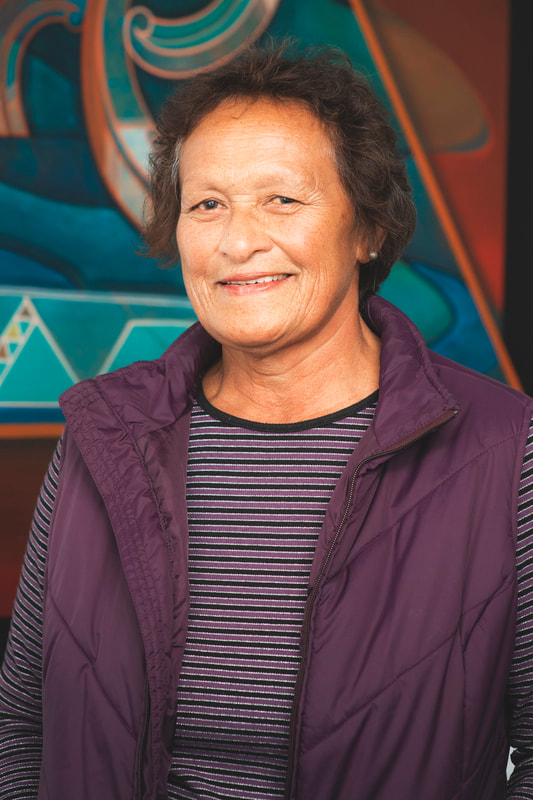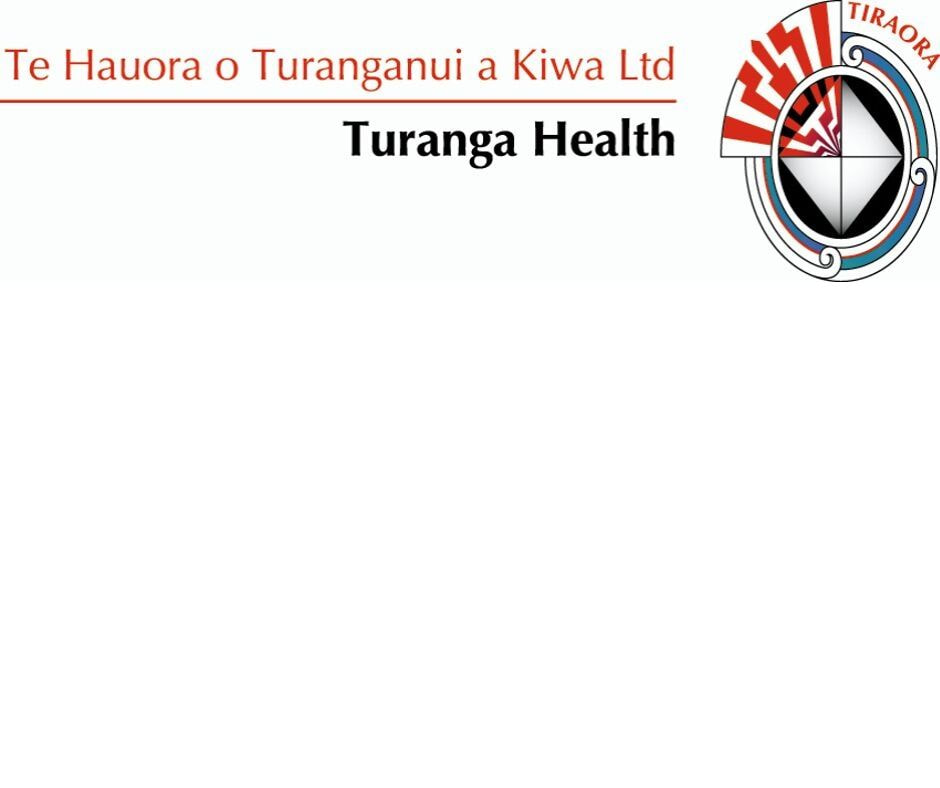 Matawai mother Robyn Tomlinson reckons she learns by “doing”, so was first in line for a lesson on plastering at Turanga Health’s latest DIY in the Whare this month. “I came down because I wanted to know how to fix my home, and how to do it myself.” Robyn is one of over 100 whānau around the rohe who has visited a Turanga Health DIY in the Whare event hosted in conjunction with Habitat for Humanity this year. Each two hour event is a one-stop do-it-yourself expo where visitors can learn tips and tricks to remedy and repair their home. Visitors learn how to plaster a hole in the wall, fix leaking taps, and heat their house for less. Visitors are also invited to bring their power bills and let the experts from Electric Village take a look and work out how to bring their monthly power bill down. Brett Goddard from Alpha Electrical, plasterer Noah Lee, DIY guru John Wauchop, and Smart Energy insulation company make up the advisory contingent. Popping down to the event at Matawai School was a no-brainer for mother of two Robyn. A hole in the wall created by a rat seeking shelter from the Matawai winter can now be filled in folllwing her hands on lesson with plasterer Noah Lee. “It was simple, it was easy to follow, and I will definitely be able to replicate that at home,” says Robyn. Matawai business woman Sue Seymour visited DIY in the Whare to get some advice about a carpentry project. She wants to build a ramp and needed to understand what might be involved before she commits herself to the project. “This has been good and I’ve learned a lot.” Turanga Health chief executive Reweti Ropiha says when whānau can repair or make their own items for their home there are obvious benefits in terms of money saved. “There are also many hidden benefits such as transferable skills, inspiring your children to try projects, and self-reliance that makes you less inclined to panic when things do go wrong.” Reweti says whānau may not save a tremendous amount the first time they are called upon to use, for example, their sink-repair skills, “but if you do this three times throughout your life you'll undoubtedly save money in the long run.” DIY in the Whare events have been held at Te Karaka, Muriwai, Whatatutu, Manutuke, Patutahi, Matawai, Mangatu and Waiherere. Keep an eye on Facebook/Turanga Health for the next DIY in the Whare.
0 Comments
 KAUMATUA OLYMPICS CHAMPIONS: Kaumatua Olympics champions (from left) Henare Stirling, Pera Smiler, Francis Galloway, Mattie Ahu, Toimairangi Duncan, Louise Kemp, Mereana Andrews, Barbara Allison and Rawiri Haapu stand proudly with their carved trophy after taking out the competition on their first-ever entry into the event. Picture by Rebecca Grunwell, Gisborne Herald. KAUMATUA OLYMPICS CHAMPIONS: Kaumatua Olympics champions (from left) Henare Stirling, Pera Smiler, Francis Galloway, Mattie Ahu, Toimairangi Duncan, Louise Kemp, Mereana Andrews, Barbara Allison and Rawiri Haapu stand proudly with their carved trophy after taking out the competition on their first-ever entry into the event. Picture by Rebecca Grunwell, Gisborne Herald. Nine contestants from Turanga Health last month took on the annual national Kaumatua Olympics in Hamilton — and won. Turanga Health’s first-ever competing team of Henare Stirling, Pera Smiler, Francis Galloway, Mattie Ahu, Tomairangi Duncan, Louise Kemp, Mereana Andrews, Barbara Allison and Rawiri Haapu were named the national champions of the 15-year-old, semi-annual event. “It’s because we cheated!” co-captain Francis (77) jokingly said. What he was admitting to, however, was that with the team’s average age being a whisker under 70, they were one of the younger teams at the Olympics. That’s because Turanga representatives had to be sure they were all well enough to make the trip to Hamilton but once they were deemed fit to attend, not one turned down the opportunity to take part. “That’s what you do when someone asks you to do something,” Barbara, 69, said. “You just say “yes” and do what you can.” The Kaumatua Olympics involves activities like line-dancing, seated volleyball, kumara toss, wheelchair relays and crowd favourite Kumba, which is Zumba modified for kaumatua. Pera, 70, said he was keen to give anything a go. “To be honest, I had no idea what we were in for but I loved the whole experience, it was magic,” he said. But team bus driver, Rawiri (66) — a three-year veteran of the Kaumatua Programme — said he absolutely went there to win, “we just happened to have a great experience at the same time”. Established 21 years ago, Turanga Health’s Kaumatua Programme continues to serve about 300 koroua and kuia in helping them maintain health, independence and community connections through fortnightly gatherings that are usually held at marae. Henare (67) said he’d never been one to really socialise, which is what prompted him to join the programme. “Going away to compete was challenging but totally worth it, we had a whole lot of laughs.” Mattie, (72), was also grateful for the opportunity to compete. “Turanga Health always shows us the greatest of care . . . but who’d have thought we could have such an amazing experience”. And 75-year-old Toimairangi said she wouldn’t have missed the event for the world, “We were all there as one, a big whanau”. After a day of games and events where the team was pitted against nearly 300 other competitors, they brought home the carved wooden trophy. And Turanga Health kaiawhina Louise Kemp (68), also a team member, said they were well cared for while they were away. “There was a beautiful bridge between rangatahi and kaumatua,” she said. “It’s like when your own mokopuna do well and make you proud,” co-captain Mereana Andrews added, about the Rototuna High School students who hosted this year’s Olympics. “From preparing the food to organising the events . . . they were incredible.” Back in Gisborne, the victors were guests of honour at a presentation event where more than 150 pakeke were at Lawson Field Theatre in support. As a bonus, there was a screening of historic footage – dating as far back as 1919 – from the New Zealand Film Archive. “This is not the first time we’ve done this and it really means a lot,” Kaumatua Programme co-ordinator Kay Robin said. “For some of our whanau the footage brings back memories, for others it’s a chance to see images they have never seen before.” Team Turanga Health say they are looking forward to defending their trophy at next year’s Kaumatua Olympics. “It would be nice to give some of our other whanau a chance to compete,” Francis said, “but if they call us, we will come running!”  Loiuse Kemp might join the pakeke in their exercise sessions but she's not ready for the kaumātua programme yet! The 69-year-old has put in 21 years of service as a Tūranga Health kaiāwhina and says she’s got more to give. “It’s been a long time, but I've been able to do wonderful, rewarding work,” she says. “I love my job to this very day.” When sourcing kaiāwhina (community health workers) Tūranga Health always looks for a good fit and in 1998, when they were looking for someone to work with pakeke (elders), they knew they’d found it in Louise. Since then, she’s been “an absolute rock”, says chief executive Reweti Ropiha. “She’s been in so many households around the district and seen so many dynamic and changing whānau situations, like being there as people have passed,” he says. “She has a way about her that draws out a high level of confidence and trust. She is the one person they ask for.” Raised by her grandmother at her Muriwai home, as a young woman Louise (Ngai Tāmanuhiri) sought the bright lights of big-city Auckland but returned in the 1980s. Throughout the 1990s she cared for her elderly father so by the time he passed away early in 1998, she was well attuned to the needs of older whānau. “Back then the Kaumātua Programme was small – nothing like the 150 older whānau we work with today – with only a few people going out to the marae for the get-togethers,” she says. “My dad couldn't get around much so having a chance to mix with other kaumātua was a really important outing for him, and that's what got me interested in the work.” As well as working at group events for pakeke, Louise joins Tūranga Health nurses in visiting them at home, working through any issues they might have and helping them access the services they need. “Especially back in the early days, many didn't understand the health issues and systems they were dealing with so when we explain in layman's terms what is happening, they can be confident they know what it means to them.” Tūranga Health chair Pene Brown says when Louise started as a kaiāwhina, their contribution to the health sector was sometimes not fully appreciated. “But we knew what they could bring and in Louise's case we embraced her for the person she was, and melded the job around her. She brought to us some beautiful skills that enabled us to help her grow as a kaiāwhina, and to have the success she has had with our pakeke.” |
Media Releases
Email us if you want to receive our media releases. Archives
February 2024
|


